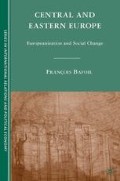Abstract
In order to grasp the interactions of the exogenous constraints of the type exerted by the EU and trade globalization with those of endogenous change, the last area we have to analyze is that of developments in the social structures. These developments reflect both a major adjustment to specifically Western dynamics and the maintenance of many traditional components. The elements involved may be the size of the primary sector in certain countries or the strengthening of religiosity in others. These are important factors that lead us to conclude that the processes of modernization are complex, that there are divergent trajectories in the two halves of Europe and that social interests slowly become structured during this period. They are so many elements that enable us to specify the nature of the social divides underlying partisan orientations in this part of Europe that, in this respect also, differs from the Western half. On the basis of this analysis, the typology of “cleavages” drawn up by Rokkan and Lipset is thrown substantially into question. The reference to recent history has been used to highlight the decisive impact of the Communist period on partisan positionings. The new inequalities that emerged in the post-1989 period, together with the European Union, have appeared to be powerful factors influencing the formation of political cleavages.
Access this chapter
Tax calculation will be finalised at checkout
Purchases are for personal use only
Preview
Unable to display preview. Download preview PDF.
Notes
Domanski, Boleslaw, 2003, “Industrial Change and Foreign Direct Investment in the Post-Socialist Economy, The Case of Poland,” European Urban and Regional Studies, 10, 2, pp. 99–118.
Szelenyi, Ivan and Szonja Szelenyi, “Circulation or Reproduction of Elites during the Post-Communist Transformation of Eastern Europe,” Theory and Society, 24, 1995, pp. 613–628
Szelenyi, I., E. WnukLipinski, and D. Treiman (eds.), “Circulation and Reproduction of Eli te s during the Post-Communist Transformation of East-Europe,” Theory and Society, 24, 5, 1995
Mink, Georges and Jean-Charles Szurek, “1989: une révolution sociale? Acteurs, structures et représentations à l’Est,” Revue d’Etudes Comparatives Est/Ouest, 25, 4, December, 1994, pp. 5–228.
Mihaly Laki, “Opportunities for Property Acquisition and Some Characteristics of Big Entrepreneurs in Post-Socialist Hungary,” Europe-Asia Studies, 55, 5, July 2003, pp. 693–710.
Wasilewski, Jacek, “Polish Post-Transitional Elites,” in J. Frentzel Zagorska and J. Wasilewski (eds.), The Second Generation of Democratic Elites. Warsaw: IPS, 2000, pp. 197–216.
Portet, Stephane, “Poland: Circumventing the Law or Fully Deregulating?” in D. Vaughan-Whitehead (ed.), Working Employment Conditions in New Members States. Geneva: ILO, 2005, pp. 273–337.
Adamski, Wladyslaw, J. Buncak, Pavel Machonin, and Dominique Martin, System Change and Modernization. Warsaw: IFIS, 1999.
Vaughan-Whitehead, Daniel, Working Employment Conditions in New Member States. Geneva: ILO, 2005.
Lado, Maria, “Industrial Relations in the Candidate Countries,” European Foundation for the Improvement of Living and Working Conditions. Budapest: ILO, 2004.
Zeechini, Salvatore (ed.), Lessons from the Economic Transition, Central and Eastern Europe in the 90s. Dordrecht/Boston: Kluwer Academic, 1997.
Vaughan-Whitehead, Daniel, EU Enlargement versus Social Europe? The Uncertain Future of the European Social Model. Cheltenham, Edward Elgar, 2003.
Lipset, Seymour M. and Stein Rokkan, Party System and Voter Alignments: Cross-National Perspectives. New York: Free Press, 1967.
Toole, James, “The Historical Foundations of Party Politics in Post-Communist East Central Europe,” Europe-Asia Studies, 59, 4, June 2007, pp. 541–566.
Glaessner, Gert-Joachim (ed.), Der lange Weg zur Einheit. Berlin: Dietz Verlag, 1993
Vecernik, Jan and Petr Mateju, Ten Years of Rebuilding Capitalism: Czech Society after 1989. Prague: Academia, 1999.
Waele, Jean Michel De (ed.), Partis politiques et démocraties en Europe centrale et orientale. Brussels: Editions de l’Université de Bruxelles, 2004.
Creed, Gerald W., Domesticating Revolution: From Socialist Reform to Ambivalent Transition in a Bulgarian Village. University Park: Transylvania State University Press, 1998.
Mchel, Patrick, La société retrouvée—Politique et religion dans l’Europe soviétisée. Paris: Fayard, 1988.
Zarycki, Tomasz, “Politics in the Periphery: Political Cleavages in Poland Interpreted in Their Historical and International Context,” Europe-Asia Studies, 52, 5, 2000, pp. 851–873.
Vachudova, Milena Anna, Europe Undivided. Democracy, Leverage and Integration after Communism. Oxford: Oxford University Press, 2005.
Cook, Linda J., Mtchell A. Orenstein, and Marilyn Rueschmeyer (eds.), Left Parties and Social Policy in Post-Communist Europe. Boulder: Westview Press, 1999
Bunce, Valerie, Subversive Institutions. The Design and the Destruction of Socialism and the State, Cambridge: Cambridge University Press, 1999
Bafoil, François (ed.), La Pologne. Paris: Fayard, 2007.
Copyright information
© 2009 François Bafoil
About this chapter
Cite this chapter
Bafoil, F. (2009). The Development of the Social Structures and the Formation of New Cleavages. In: Central and Eastern Europe. The Sciences Po Series in International Relations and Political Economy. Palgrave Macmillan, New York. https://doi.org/10.1057/9780230623965_10
Download citation
DOI: https://doi.org/10.1057/9780230623965_10
Publisher Name: Palgrave Macmillan, New York
Print ISBN: 978-1-349-37444-1
Online ISBN: 978-0-230-62396-5
eBook Packages: Palgrave Political & Intern. Studies CollectionPolitical Science and International Studies (R0)

